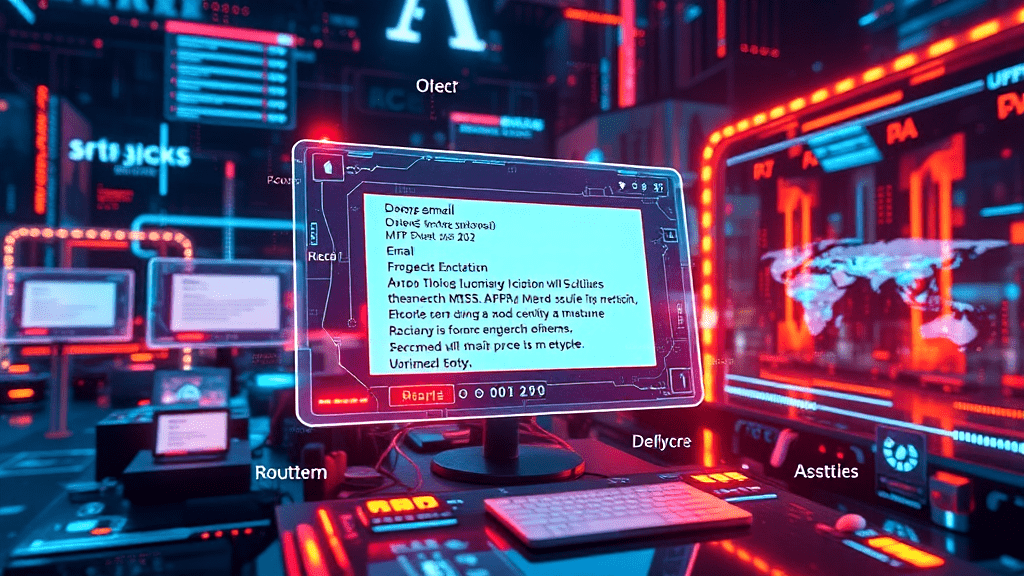Encrypted email
In today’s digital age, keeping your emails secure is a must. Email encryption is like a digital lock that keeps your messages safe from prying eyes. Think of it as a secret code that turns your email into a puzzle that can be solved only by the intended reader. With online threats lurking, understanding how to use encryption is important. Imagine being a Christian conservative entrepreneur who needs to send sensitive data. Encryption is your best friend. It’s not just about safety; it’s about trust. Plus, it’s a key part of any reliable tech partner program. Whether you’re using team collaboration tools or a private cloud provider, encryption ensures your communication stays private.
Why Email Encryption Matters
The importance of encrypted email lies in shielding sensitive data from prying eyes. It acts as a digital lock, ensuring privacy and regulatory compliance. Businesses benefit by meeting industry standards, enhancing trust. Secure communication is essential in today’s digital world.

Types of Email Encryption Methods
Exploring methods for securing emails, symmetric encryption is simpler, using one key. On the flip side, asymmetric encryption involves a duo of keys, adding complexity but boosting security. Both methods aim to protect sensitive information, ensuring messages remain private.
Symmetric vs. Asymmetric Encryption
Comparing encrypted email methods, symmetric encryption uses one key for both processes, offering simplicity. In contrast, asymmetric encryption uses a public-private key pair, enhancing security. Balancing ease and safety is key when choosing the right method for your needs.
End-to-End Encryption Explained
When discussing encrypted email, data gets scrambled on the sender’s device and unscrambled by the recipient’s device. This keeps your sensitive information secure from prying eyes. It’s like sending a sealed letter that only the addressee can open.

Choosing the Right Encryption Software
Finding the perfect encryption software is like choosing the right tool for the job. Look for software that integrates seamlessly with your email marketing software. Ensure it supports encrypted email effortlessly, balancing features and ease of use. A trusted freedom tech partner can guide you.
Popular Encryption Tools for Emails
Exploring the tools that encrypt emails, PGP stands out. It’s a favorite among tech enthusiasts for its robust security. Meanwhile, S/MIME is popular in corporate settings, offering seamless integration. Choosing between these depends on your specific needs.
| Tool | Type | Features | Popularity |
|---|---|---|---|
| PGP | Asymmetric | Open-source, secure | Tech-savvy |
| S/MIME | Asymmetric | Corporate integration | Corporate |
| ProtonMail | End-to-End | User-friendly, private | General users |
| Tutanota | End-to-End | Encrypted calendar | Privacy-focused |
| Mailfence | End-to-End | Secure collaboration | Business users |
Comparing Free and Paid Options
When weighing free against paid options for encrypted email, consider your needs. Free versions offer basic protection, while paid versions include advanced features like robust security and support. Choose wisely, as your choice impacts privacy and liberation technology services.

Setting Up Email Encryption
Embarking on the process of configuring encrypted email involves selecting the right tool. Installing necessary software is next. Then configure settings for encryption. Encountering setup challenges? Address compatibility issues with email clients, and tackle key management hurdles with proper documentation.
Step-by-Step Guide for Beginners
Implementing encrypted email begins with choosing the right tool. Install the software, then configure settings for encryption. Don’t shy away from compatibility issues; they can be tackled with proper documentation and support from your freedom tech partner.
Common Setup Challenges and Solutions
Setting up encrypted email can feel like herding cats. Compatibility issues with email clients often cause frustration. Key management is another head-scratcher. Thankfully, tech support and detailed documentation can provide the lifeline you need to navigate these challenges.
Best Practices for Secure Communication
Prioritize protecting your encryption keys to maintain secure communication. Encrypted email users should regularly update private keys to prevent unauthorized access. Stay alert for phishing and spoofing attacks by verifying sender information and using email filtering solutions effectively to ensure safety.
Protecting Your Encryption Keys
Safeguarding your private keys is crucial when using encrypted email. Regularly update and securely store them to prevent unauthorized access. To maintain security, consider these steps:
- Use strong passwords.
- Regularly back up keys.
- Avoid sharing keys.
- Monitor access logs.
- Use multi-factor authentication.
Recognizing Phishing and Spoofing Attacks
Spotting phishing and spoofing attempts in encrypted email can be tricky. Watch for odd sender details and unexpected attachments. Stay sharp by double-checking URLs and email addresses. Always confirm with the sender if something seems fishy.

Troubleshooting Common Encryption Issues
Addressing usual encryption hiccups involves checking encrypted email settings. Verify key compatibility between sender and receiver. Update outdated software to ensure smooth communication. Consider consulting Freedom Tech Partner for advanced support in tricky situations.
Dealing with Compatibility Problems
Tackling compatibility issues with encrypted email? Ensure all involved parties use compatible software. Double-check settings and update software regularly. If persistent issues arise, consulting Liberation Technology Services might provide effective solutions. Remember, seamless communication is key to successful encrypted messaging.
Ensuring Message Integrity
Verifying the integrity of your messages is crucial. Use encrypted email to safeguard against tampering. Regularly check encryption protocols and ensure compatibility. In conservative email marketing, maintaining trust is key. Freedom Tech Partner can assist in securing your communication effectively.
Benefits of Encrypted Email in Business
When considering encrypted email, businesses gain enhanced security, safeguarding sensitive data from prying eyes. This ensures privacy, compliance, and boosts trust with clients. Plus, it mitigates risks of data breaches, keeping your company’s reputation intact.
Enhancing Privacy and Compliance
Improving security and regulatory adherence with encrypted email is crucial. This approach safeguards sensitive data, ensuring confidence and compliance. Businesses benefit by reducing the risk of breaches. Embracing this practice fosters trust, meeting industry standards while protecting privacy and maintaining competitive advantage.
Real-Life Examples of Encryption Use
Exploring real-world scenarios, encrypted email ensures protection against cyber threats. A financial firm secures client transactions, while healthcare providers safeguard patient data. Government agencies shield classified information, maintaining confidentiality and integrity. These examples illustrate encrypted email’s critical role in securing sensitive data.
Future of Email Encryption Technology
Peering into the future, encrypted email could become more seamless and user-friendly. As technology evolves, expect improvements in security and accessibility. Innovations like automated key management might redefine encryption, making it easier and more intuitive for everyone to use.
